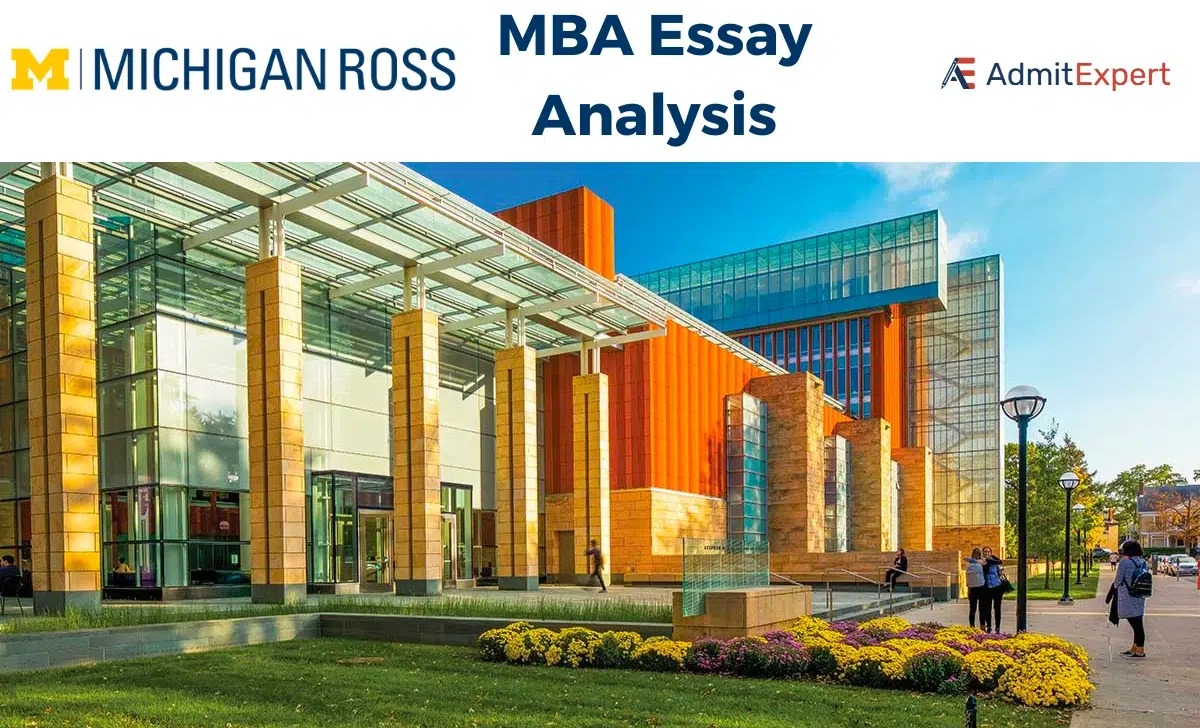Writing an MBA essay can be a pivotal step in your journey towards earning a coveted spot in a top business school. It’s a chance to let your personality shine, communicate your goals, and explain why a particular institution is the perfect fit for you.

In this comprehensive article, we delve into the importance of MBA essays, the various types you might encounter, expert MBA essay tips, and provide a roadmap for crafting impeccable B-School essays. Whether you’re pondering “Why MBA and Why Now?” or tackling the intricate “Why this Business School?” question, we’ve got you covered. Dive into the world of MBA essays, where your aspirations and abilities find their voice.
The Importance of MBA Essays
MBA essays are a perfect opportunity to showcase your strengths and explain any weak points in your application. A well-written essay can provide context to a low GMAT score or GPA, but strong numbers will never make up for a weak essay.
Renice Jones, Ex. Assistant Director of Recruitment and Admissions at Schulich MBA program rightly said:
“Candidates who are below average can use the other components of the application, such as the essays, to exhibit why they may be a great fit for Schulich.”
MBA essays also become very important if you are from an over-represented pool of candidates, such as an Indian male IT/software engineer. Like you, many candidates will have similar work profiles and experiences. You cannot change your work experience but can make sure that you portray your spikes to the admission committee through your essays.
Stanford MBA admissions committee gives this advice to its applicants every year,
“There is no typical Stanford MBA student, no ideal for applicants to chase. Our advice is to just focus on you and ensure that your application is a true reflection of yourself.”
MBA Essays – A way to showcase your personality
A compelling MBA essay helps the Adcoms get a peek inside your personality. Chad Losee, HBS Managing Director of MBA Admissions and Financial aid, pointed out that their primary goal in the essay is to get to know you better. The decisions you have made, your motivations, or any formative experiences. However, you must not shy away from your personality in the process.
The MBA admissions team at Yale School of Management held a webinar, where they talked about what they are interested in knowing through its essay.
How to impress the MBA admissions committee in the admissions events.
Here are a few tips in this article.
Yale SoM MBA essays are generally open-ended, like – “Describe the biggest commitment you have ever made.” For this essay question, the admissions committee is interested in knowing how you approach commitments and the behavior that supports them. It can be a personal or a professional story, as long as it is something distinctive to your life and helps them know more about your personality.
It is the story that you put together about your passion, experience, goals, and how business school fits into that mix that sets you apart from other candidates.
Types of MBA Essays
Although the MBA admissions essay questions differ across schools, they tend to evaluate you based on who you are, what you have done, and what value you can add.
Thus, there are a certain set of questions that help the Adcoms evaluate your candidacy. The length of an essay can range from anywhere between 200 – 1500 words, depending on the business school. But, remember each question is crafted in such a way that helps the Adcoms to know you better and evaluate your fit with the B-school.
We have helped many students craft their MBA essays and created a list of 6 most common essay questions that you can expect on your MBA application:
Here are the 6 most common essay questions that you can expect on your MBA application:
- Why MBA and Why Now?
- Why this Business School?
- Leadership essay
- Video essay
- Open-ended essay
- Community/Contribution essay
Why MBA and Why Now?
This essay is the most common question, which requires you to logically craft a link between your past experiences, your future aspirations, and how pursuing an MBA fits in. This essay aims to understand your motivation to pursue an MBA. In hindsight, this type of essay question can also incorporate your goals.
However, you can even get a question that is just focused on what your short and long-term goals are? For example, Tuck MBA question on why MBA and how your prior experience and MBA from Tuck fits in.
Why this Business School?
This essay aims to see how your goals fit into applying to XYZ business school. In this essay, you need to state how pursuing an MBA from that particular B-school will enable you to achieve your short and long-term goals.
The admissions committee wants to know if you have done your research on the business school.
For example, Kellogg is known as one of the best business schools for Marketing. So, if you aspire to become a successful marketer, schools like Kellogg can be a good fit for you.
Leadership essay
Leadership qualities are ones that every top business school looks for in a candidate. This essay aims to know about instances where you have shown leadership.
Remember, you don’t have to be a manager or lead a team to showcase leadership qualities. Cases in which you have changed opinions, shown integrity, take crucial decisions, displayed structured thinking, etc. can also demonstrate leadership skills.
For example, essay questions that ask you to provide instances where you have shown leadership and challenges related to ethics you have faced (HEC Paris).
ISB also has a question on similar lines –examples of the most important personal quality that will lead you to become a successful leader.
Video Essay
The video essay evaluates your language skills, confidence, and capability to think on your feet. It is an opportunity for you to create a good first impression on the admissions committee.
Moreover, video essays give a chance to the Admissions committee to put a face on the application received.
Kellogg and MIT Sloan are a few business schools that ask candidates to submit video essays. MIT Sloan asks you for a 60-sec video where you need to introduce yourself to your future classmates. Kellogg’s video essay consists of three questions – An introduction about yourself, the path you are interested in pursuing, and the challenges you have faced.
Open-ended essay (Value-based/personality)
This type of essay question evaluates your values and personality. For example, describe your biggest commitment (Yale), values that have guided your life and work (Kellogg), or showcase your personal characteristics by providing instances (INSEAD).
Community contribution
Contribution to the community is an integral part of many top business schools. The aim is to reflect upon your unique background and think about the values you can add to the community. For example, the Cornell essay analyzes your desire to impact communities and organizations positively. They want to understand how you will make a meaningful impact on Cornell’s MBA community.
MBA Essay Tips
Crafting a compelling B-School essay can be the key to unlocking the door to your dream MBA program. Here are some expert tips to help you write an unforgettable essay that stands out from the crowd:
1. Showcase Proactivity: Business schools seek leaders who are proactive and innovative. Emphasize your ability to take initiative and drive change.
2. Embrace Uniqueness: Highlight what sets you apart from others rather than focusing solely on achievements. Showcase your individuality and what makes you truly unique.
3. Tailor Each Essay: Provide specific reasons why you’re a great fit for each school. Avoid generic statements and demonstrate your understanding of the program’s unique offerings.
4. Inject Passion: Let your enthusiasm shine through in your writing. Admissions officers want to see what excites you and how you’ll bring that energy to the classroom.
5. Break the Mold: Challenge conventional perceptions with unexpected essays that reveal different facets of your personality and experiences.
6. Embrace Your Journey: If you’ve taken an unconventional path to business school, embrace it. Admissions officers appreciate candidates who have taken risks and overcome challenges.
7. Address Identity and Background: Discuss your gender, ethnicity, or minority status only if it has influenced your perspectives or experiences significantly.
8. Use Real-Life Examples: Enrich your essays with specific anecdotes and vivid details that illustrate your qualities and achievements.
9. Show Your Humanity: Don’t be afraid to show vulnerability or humor. Admissions officers appreciate authenticity and want to connect with the real person behind the application.
10. Be Authentic: Write about what truly matters to you, not what you think the admissions committee wants to hear. Your essays should paint a clear picture of who you are, what drives you, and what you’re passionate about.
Kris Mercuri, Director of Admissions, Recruiting and Outreach at the Yale School of Management states, your essay is an “opportunity to speak in your own voice about something meaningful and distinctive in your life.” Don’t waste this opportunity by writing about something inauthentic that you think will make you look better, but is actually a pretense.
11. Structure Matters: Follow a clear structure for your essays, including the setup, the pivot point, and the future. This helps you present your story cohesively and effectively.
12. Answer the Prompt: Ensure your essays directly address the questions asked. Don’t get sidetracked by showcasing all your achievements; focus on what’s relevant to the prompt.
13. Be Succinct: With word limits becoming stricter, keep your essays concise and impactful. Highlight essential points and let your voice shine through without overwhelming the reader with unnecessary details.
14. Focus on the Business School: Tailor your essays to each business school, demonstrating your understanding of the program and how you’ll contribute to its community and culture.
How to write a great MBA essay
The admissions committee reads thousands of essays every year. For your essay to stand out, you must put a comprehensive picture of who you are and how you fit into the B-school program. Your essays need to be interesting and unique if you want to grab Adcom’s attention.
Here is a stepwise process that you should follow to write an essay that Adcom would want to read:
Step 1 – Start Early
One of the mistakes that candidates make is to start writing their essays near the application deadline. Writing compelling MBA essays needs deep introspection. You need to take a step back and look into various instances in your life, such as:
- Your past experiences that led to where you are today.
- Your future aspirations
- The turning points and defining moments in your life
- Your accomplishments – past, present, future
- The decisions that helped in shaping your core values
- Your learnings from failure
- Your perspective and experiences that shaped your passion
Jotting down such instances requires you to sit down, clear your mind, and think about everything that has led you to become who you are and what you want to be. Thus, it would be best to give yourself enough time to introspect. Your mind will respond better when you don’t have a deadline to meet.
It’s recommended that you start your essays at least 5-6 months before the deadline. This way you’ll get enough time to self-reflect and inculcate the process of thoughtful introspection in your routine.
Identify incidents around some common skills that Adcoms look for – Academic Excellence, result-oriented, Leadership, Team management, and Learning.
Step 2: Know your Whys
You must get familiar with the most common essay questions:
- Why MBA?
- Why is it the best time to do an MBA?
- Why XYZ MBA Program?
Although not all business schools ask you these questions, they are bound to come up in the interview if not in your essays. Moreover, answering these questions can help you get clarity and focus on how to position yourself. You must create a logical link between these three questions by connecting your goals and aspirations.
Tips on answering the ‘Why’ MBA essay questions
Here are a few tips on how you can go about finding the answer to these questions:
- Why MBA? Look into your future aspirations and how pursuing an MBA fits into them. You should establish a clear, logical, and career-oriented reason for pursuing an MBA.
- Why MBA Now? Look into your past experiences and provide context as to how pursuing an MBA now fits into your plans. You need to make sure that Adcoms understand that it is the right time for you to pursue an MBA.
- Why XYZ MBA Program? Evaluate how aligned the business school is with your career goals. For example, if you are looking for leadership development during the course, check if that B-school offers such a program. You also need to align your values with the school. Go to the selected business school website and see if their values align with yours. For example, ISB values openness, passion for excellence, collaboration, initiative, and innovation. So, if these values are in-line with your values, ISB is a good fit for you.
Step 3: Decode the essay prompt
Once you self-reflect and get familiar with the standard essay questions, it’s time to decode the essay prompt. Each B-school has a unique essay question through which Adcoms evaluate a specific set of things. Understand what the Adcoms are looking to know from that particular question. For example, essay prompts such as, “Describe what you learned from your most spectacular failure?” Here, the Adcom wants to know how you overcame your biggest failure and learned something meaningful from that experience.
Step 4: Create a draft and respect the word count
After understanding what is required in a particular essay question, create a draft within the word limit. Chad Losee from HBS points out that essays should be about the right length. Use your judgment and be clear and concise in your writing. Moreover, you need to make sure that your essay adds new information. What more is there to you apart from your resume, LOR, and numbers?
Here are a few tips for writing an essay:
- Provide instances wherever necessary. Write instances in the form of stories. We suggest using a SAR format – Situation, Action, and Result. Start your story by providing a context, and mention the action you took and the results of your actions.
- Make sure the essay is in a flow. Have your story structured so that it conveys the overall message.
- Make sure that your essay has correct/genuine content. It should be concise, cohesive, clear, and convincing.
- Your Essays should be in line with your overall MBA application.
- Do not be afraid to show your vulnerability. Adcoms are more interested in knowing how you tackle them.
- Invite inputs from others.
Step 5: Review and Submit
You must review your application before submitting it. Readout your essay aloud and ask yourself, could this essay also describe someone else? If yes, it’s probably not personal enough to add to your overall application.
It helps to get a fresh perspective on your essay. Ask your friend, family, or colleague to read it. Their inputs can be valuable as they know who you are and provide characteristic traits that you might have missed. Moreover, they can also help you understand how others perceive you and if it is consistent with what you have written.
10 Common Mistakes to Avoid While Writing MBA Essays
Here is a quick overview of mistakes that you should avoid while writing essays:
- Going over the word count.
- Lack of the 5C’s – Correct content, cohesive, concise, clear, and convincing.
- Too many instances.
- Not providing something new. Repetitive content.
- Lack of introspection.
- Candidates tend to copy/paste the same answer that they used in a different B-school application.
- Not proofreading.
- Not addressing each part of the question.
- Lack of flow.
- Lack of reason for why MBA, Why now, and Why XYZ B-school?
We hope that this article provides you with insights into how to write your MBA essay. We can help you write amazing essays.
Our MBA admission consultants have been part of the actual MBA admission team and interview panel at top global B-schools. Therefore, we know what the MBA admissions team actually looks for in a candidate and can guide you accordingly.
How we’ll help you write amazing essays
Our MBA admission consulting services are structured considering the above points. Broadly, our services cover the following:
- Narrative building by a lead consultant, who is a top B-school alum and has got extensive admission consulting experience
- Identifying your leadership personality trait
- Identifying and Shortlisting incidents from your personal and professional life having a significant impact and leadership traits
- Aligning your post MBA career goals with these skills and leadership traits that you have displayed in the above incidents
- Customizing the narrative by school mentors, who are alumni of the B-schools you are applying to
- Customizing the narrative by an industry mentor, who is a top B-school alum from your industry/function
- Essay editing – multiple iterations
- Essay review by school mentors
- Resume and Letter of Recommendation guidance
- Interview prep
If you follow the above method, you can crack any B-school essay. For more information on our plans and pricing, please visit our plans and pricing page. For a free profile evaluation, please write to us at contactus@admitexpert.com or fill out the form.
MBA Essay – FAQs
MBA essays are your chance to showcase your worth to your target business school. They are an excellent means to distinguish your application and let the admissions committee know the real you.
Yes. Essays are the only place in your application where you can reveal your aspiration, why an MBA makes sense as the next step in your career path, and address any drawbacks in your application. They help the Admission committee know the person behind those facts and figures in your application. Thus, an MBA essay is a crucial part of your application.
The length of your MBA essay depends on the program, but generally, essays are anywhere between 200-1200 words. The important thing to remember is that you should not go over the word limit and if the limit is not set by the program, make sure your essay is cohesive, concise, and clear.
To start an MBA essay, make sure that you self-reflect and do some introspection about your life and career. Think about your past experiences and how they have shaped you. Get yourself familiar with the common essay questions like why MBA and why now. It is important that you identify incidents around some common skills that Adcoms look for – Academic Excellence, result-oriented, Leadership, Team management, and Learning.




